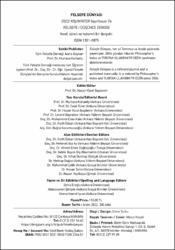Rethinking Philip Kitcher’s science policy in times of a global pandemic
Künye
Kaptan, M. (2022). RETHINKING PHILIP KITCHER’S SCIENCE POLICY IN TIMES OF A GLOBAL PANDEMIC . Felsefe Dünyası , 2 (76) , 338-351 . Retrieved from https://dergipark.org.tr/en/pub/felsefedunyasi/issue/73823/1096567Özet
İngiliz felsefeci Philip Kitcher’in Science, Truth and Democracy (Bilim, Gerçek ve Demokrasi) kitabının üzerinden yirmi yıl geçmiş dahi olsa bugün, bilim hayatımıza yön vermeye devam ettiği sürece, güncelliğini koruduğu görülmektedir. Bilimin toplum içerisindeki rolü ve etrafında şekillenen sosyal politikalarla ilgili tartışmalar özellikle global pandemi dönemiyle hayatlarımızın merkezi durumundadır. Bu çalışma Kitcher’in “ideal düzenlenmiş bilim” kavramını, yazarın ilgili argümanının tutarlılığı ve yöntemsel olarak uygulanabilirliği açısından tartışmayı amaçlamaktadır. Sosyal politikalara ve yönetmeliklere, sadece mevcut durumlar üzerinden yapılan bir analiz zemininde karar verilmesi gerektiğini öne süren bu okuma, aynı zamanda Kitcher’in ideal modelinin aksine bilim insanları, siyasetçiler ve toplum arasındaki diyaloğu temel alan gerçekçi ve uygulanabilir bir yöntem önerecektir. The relationship between policies of science and democratic debates is and probably always will be a current topic as long as science keeps shaping our lives. The renowned British philosopher Philip Kitcher’s Science, Truth and Democracy is still relevant today, some twenty years after its first publication, as the heated debates concerning the role of science and its social consequences rage on. This paper evaluates Kitcher’s main argument about an idealistic well-ordered science as policy by referring to its internal coherency and its practical applicability as a method. After having discussed his arguments on significant truth and his theory of well-ordered science, we will propose that it is only by using our analysis of the current state of things, we can develop social policies and regulations. Thus, the result would not just be a description of an ideal model, but a realistic suggestion of applicable policies based on communication between scientists, policymakers, and the public.

















